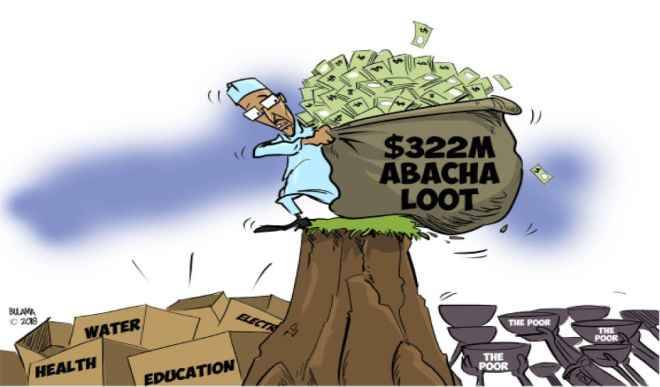Green light, red light: Recovered Abacha loot raising dust
The decision to share N5,000 to poor Nigerians as part of government’s conditional cash transfer programme is generating controversy among Nigerians. The government of Switzerland, based on an agreement signed by the Nigerian government with Swiss banks and the World Bank, recently returned $322m Abacha loot to Nigeria. But the recovery and management of recovered […]


The decision to share N5,000 to poor Nigerians as part of government’s conditional cash transfer programme is generating controversy among Nigerians.
The government of Switzerland, based on an agreement signed by the Nigerian government with Swiss banks and the World Bank, recently returned $322m Abacha loot to Nigeria.
But the recovery and management of recovered assets for the benefit of poor Nigerians said to be the ultimate victims of corruption is plagued with problems.
These problems according to experts include lack of a policy framework for the management of recovered looted assets, re-looting of recovered assets by corrupt public officials, low public awareness and advocacy on the recovery and use of the looted assets. The federal government through its Monitoring of Recovered Assets through Transparency and Accountability (MANTRA) project explained why the funds are being used for the cash transfer programme.
It noted that the Swiss court order that commenced the repatriation of Abacha loot was made on the condition that the World Bank would supervise the utilization to prevent mismanagement and re-looting.
Also, to enable the mandatory involvement of the World Bank in the process, the money had to be used in a subsisting programme of the bank in Nigeria to enable it use existing monitoring and broader institutional resources to monitor use of the funds.
It added that the World Bank was already implementing a social investment programme in Nigeria, and it was decided that the Abacha loot be channeled to fund the cash transfer component of the programme.
Government said beneficiaries of the programme are households contained in the National Social Register which is developed by the National Social Safety-Nets Coordinating Office (NASSCO) in collaboration with the World Bank.
However, critics of the Abacha loot cash transfer programme have argued that payments, about nine months to the general elections, are suspicious.
A finance expert who does not want his name in print said, “Even if you are not- partisan you would think that this is an avenue to bribe the people.”
He noted that the money should be given to an international non-profit organization to disburse, and not government agencies because of integrity and transparency issues.
It was noted that going by the current exchange rate, $322m converts to N116.81bn, which when divided by the 36 would be over N3.2bn per state. The money, it has been claimed, could be utilized to address infrastructure shortfalls in many states.
Mr. Auwal Musa Rafsanjani, the Executive Director, Civil Society Legal Advocacy Centre (CISLAC), in a position paper; ‘Improving the Use of Recovered Assets in Nigeria: CSOs Perspective,’ also called for better coordination. He said the Proceeds of Crime Act or other appropriate legislation must clarify the issue of coordination for assets recovery management among the anti-corruption agencies with the powers to confiscate assets. He said a transparent system where the civil society has a role must be established with a view to compensate victims of misappropriated assets.
The Executive Secretary, Presidential Advisory Committee Against Corruption (PACAC), Professor Bolaji Owasanoye, told Daily Trust that the controversy over utilisation of the funds is only academic, because there is an agreement on how Nigerians should use the money.
“Yes, you can find one million things you can use the money for, Nigeria had a number of options on how to use the money. If Nigeria did not concede to some of these terms the money would not be here by now, we would have problems accessing the money. It’s a different issue, to say. Why should they tell us how to spend our money, we did not like it, but they said we have a court judgment from our country that said this is what must happen.
“In order to get our money back, we needed to look at the best project that would fit into the government program and the needs of Nigerians, that is what happened,” he said.
The Chairman of the Senate Committee on Anti-Corruption and Financial Crimes, Chukwuka Utazi, also spoke on the importance of providing the legislative mechanism for assets recovery.
He spoke as a member of a panel on Improved Assets Recovery and Asset Return at the roundtable of AU Champions on Anti-Corruption recently held in Abuja.
The Speaker of the House of Representatives, Yakubu Dogara, on Tuesday said the House would act to check the confusion around the recovery of looted funds and assets.
“It is common knowledge that there are conflicting reports and claims from various agencies of government concerning the status of the funds and assets recovered.
He said the House had mandated its committee on financial crimes to investigate the management and disbursement of funds recovered in the last 12 years.
